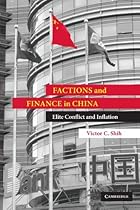Factions and Finance in China: Elite Conflict and Inflation

| Author | : | |
| Rating | : | 4.76 (951 Votes) |
| Asin | : | 0521106478 |
| Format Type | : | paperback |
| Number of Pages | : | 268 Pages |
| Publish Date | : | 2016-08-30 |
| Language | : | English |
DESCRIPTION:
This book serves as an important reference point for all subsequent work on Chinese banking.. Drawing from interviews, statistical analysis, and archival research, this book is the first to develop a framework with which to analyze how elite politics impact both monetary and banking policies. How does the Chinese banking sector really work? Nearly all financial institutions in China are managed by members of the Communist Party, yet economists and even those who engage the Chinese banking sector simply do not have a framework with which to analyze the links between banking and politics
"Brilliant" according to Awolfe. Shih's model is simple and brilliant. Though it complicates the normal factional model that I've seen elsewhere, Shih is convincing in his historical rooting of the actors. The only thing I wish he had explored with a bit more gusto would have been the role that institutionalization of power in China has weakened fact. The Foundations of a Planned Chinese Monetary System Shih's book is a very clear, well-researched explanation of the dynamic driving China's reforms. It is especially good as a companion to Yasheng Huang, Capitalism with Chinese Characteristics(2008). Where Huang laments that China's reforms imploded in an orgy of statist meddling, Shih allows us to see the compelling m. fascinating! Law student great look into China's politics and banking, actually explains quite about about China's inability to switch from an export based, dollar propping up economy to a consumer society. This, combined with the more recent articles coming out of China really put to lie the idea that the Communist Party is some cool, calcul
He attended the George Washington University on a University Presidential Fellowship and graduated summa cum laude in East Asian Studies with a minor in Economics. Born in Hong Kong, Professor Shih immigrated to the United States at the age of 12. Victor C. He is the author of numerous articles appearing in academic and business journals, including
He argues that rather than a duel between conservatives and reformists, Chinese policy making represents a series of compromises between a "generalist" faction that derives support from local provincial authorities vying with a "technocrat" faction supported by central government bureaucrats seeking to consolidate control in BeijingProf. Prof. Shih presents a statistical model that aims to prove his theory, but the book comes to life when he launches into a narrative depicting the post-1978 struggles among China's political eliteAs China's role in buoying the global economy continues to deepen, building a proper framework for understanding that push and pull in elite politics-and using those tools to foresee possible outcomes of Chinese policy becomes essential. Shih shows he is equally gifted at both." Bruce Dickson, George Washington University"Shih offers a political-economic explanation of a dual feature of the post-reform Chinese financial system-an inflationary cycle and a
